| | | | | | | Presented By Malwarebytes Business Solutions | | | | Axios World | | By Dave Lawler ·Oct 07, 2021 | | Welcome back to Axios World. - Today's edition (1,956 words, 7 minutes) starts in France, with stops in Beijing and Newcastle, U.K.
Heads-up: The Nobel Peace Prize will be awarded tomorrow, though based on recent history, perhaps they should just stop doing that? | | | | | | 1 big thing: French far-right gets new frontman |  Data: Harris Interactive; Chart: Axios Visuals A far-right firebrand is shaking up the French presidential election and, with six months to go, has pulled into second in the polls. Why it matters: This race had long seemed on course for a rematch between President Emmanuel Macron, now an unpopular incumbent, and far-right leader Marine Le Pen. But it's Le Pen who's now facing a major threat on her right flank. Driving the news: Éric Zemmour, a writer and TV pundit sometimes compared to Tucker Carlson, is second in the latest Harris Interactive poll — a crucial benchmark, as the top two finishers will enter a runoff. Never before has a candidate jumped so quickly in the polls, pollster Antoine Gautier told AFP. - Zemmour — who was convicted in 2009 of inciting racial hatred and is an advocate of the "Great Replacement" theory popular among white supremacists — has yet to enter the race, but took a leave of absence from the French equivalent of Fox News
- He's been an intellectual reference point for the far-right for many years on issues like national identity and gender roles, says Célia Belin of the Brookings Institution. "He's very bright, he's very knowledgeable, he has a passion for history, and like a good ideologue, he tweaks history to serve his own arguments."
- Like Donald Trump, Belin says, Zemmour has energized his voters with his willingness to say things that no mainstream politician would dream of saying.
- And just as Trump drove immigration to the top of the 2016 agenda, Zemmour has kept issues like the role of Islam in French society at the center of the political debate (he wants to ban non-French first names, like "Muhammad").
His rise is a major threat to Le Pen, who had been seeking to broaden her appeal to a wider slice of the electorate after losing to Macron in 2017 by a margin of 34% to 66%. - A split in the far-right vote could provide an opening for a candidate like Xavier Bertrand, who is seeking the nomination of the center-right Republicans.
- The Harris poll gives Macron the slimmest of margins (51% to 49%) in a hypothetical runoff with Bertrand, and slightly larger leads against Le Pen (53% to 47%) and Zemmour (55% to 45%).
Yes, but: It is very, very early. At this time in the 2017 cycle, Macron was jockeying for third place with far-left candidate Jean-Luc Mélenchon and incumbent President Francois Hollande, who ultimately elected not to run. - That race was characterized by "a movement towards centrism and modernization and anti-incumbency," Belin says. At present, "the mood is populist, it's radical, it's extremist."
The big picture: A former member of the center-left Socialists who campaigned in 2017 as the candidate of "neither left nor right," Macron has drifted rightward while in office, particularly in the wake of recent terror attacks. - He seems focused on winning over center-right voters, believing left-leaning voters have little choice but to stick with him, Belin says.
- Indeed, all of his major challengers at present are on the right. Mélenchon has 11%, Greens candidate Yannick Jadot has 6%, and the Socialist mayor of Paris, Anne Hidalgo, also polls at 6%.
|     | | | | | | 2. Xi hunkers down | 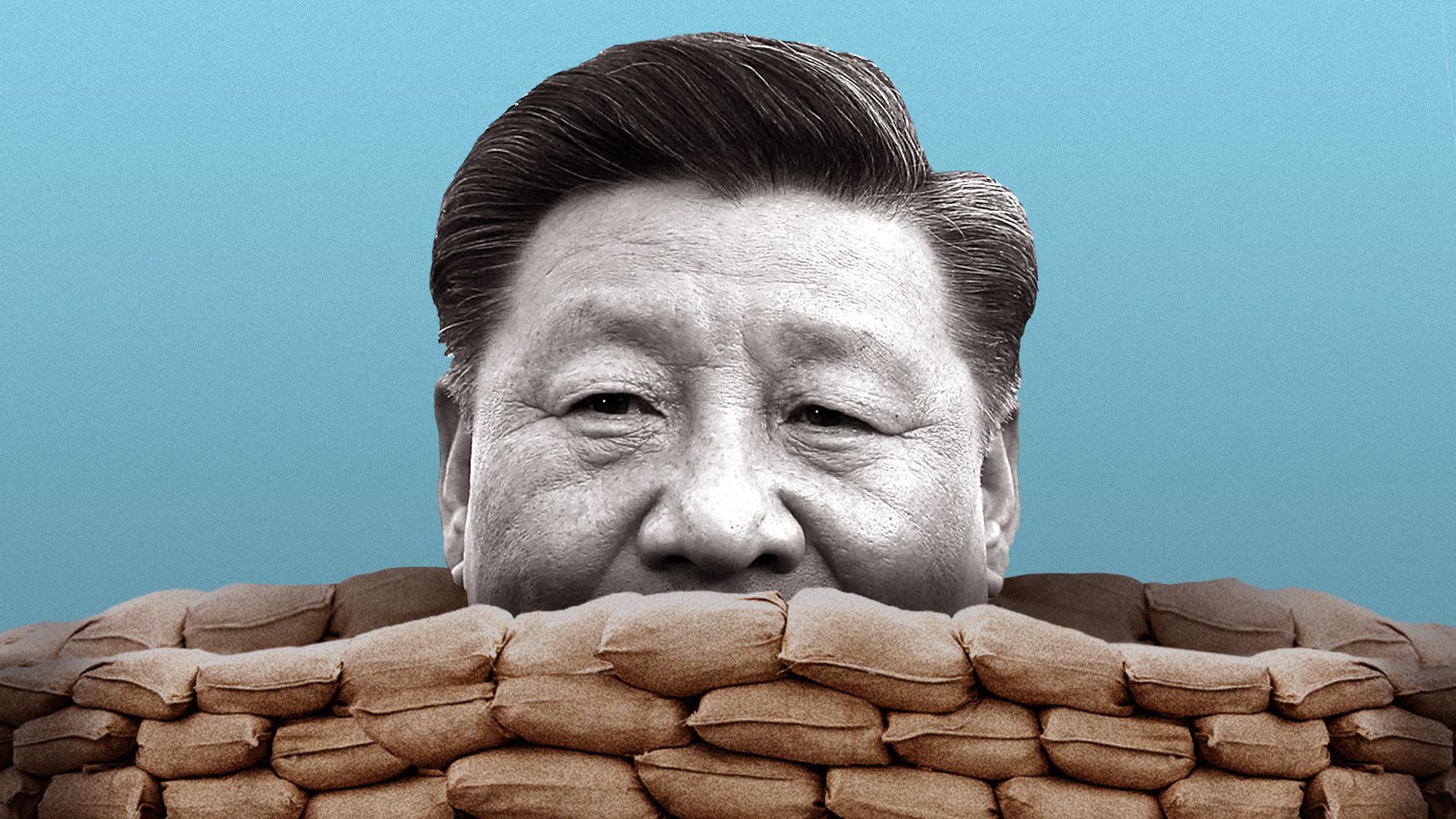 | | | Photo illustration: Shoshana Gordon/Axios. Photo: Orestis Panagiotou/EPA/Bloomberg via Getty Images | | | | China's President Xi Jinping has not left the country in 628 days — the longest streak without international travel by any G20 leader. And he won't be breaking it anytime soon, Axios' Zach Basu writes. Driving the news: Xi is not expected to attend the G20 summit in Rome at the end of this month, nor the UN Climate Summit in Glasgow a few days later. - At a moment when fresh commitments are desperately needed to head off the most severe impacts from global warming, the leader of the world's largest emitter will be the elephant not in the room.
The White House touted yesterday's meeting in Zurich between national security adviser Jake Sullivan and his Chinese counterpart as a key step to setting guardrails in the relationship. - But the only deliverable the two sides came away with was an agreement "in principle" for a virtual summit between Xi and Biden before the end of the year — a glorified Zoom session, in other words.
Between the lines: Personal diplomacy was the core element of Xi's foreign policy approach before the pandemic. - He made an average of over 14 trips abroad annually from 2013 to 2019, becoming the first Chinese leader to surpass his U.S. counterparts in international travel since at least the Cold War, according to an analysis by the Lowy Institute.
|     | | | | | | 3. U.S. and China stuck at the starting line | 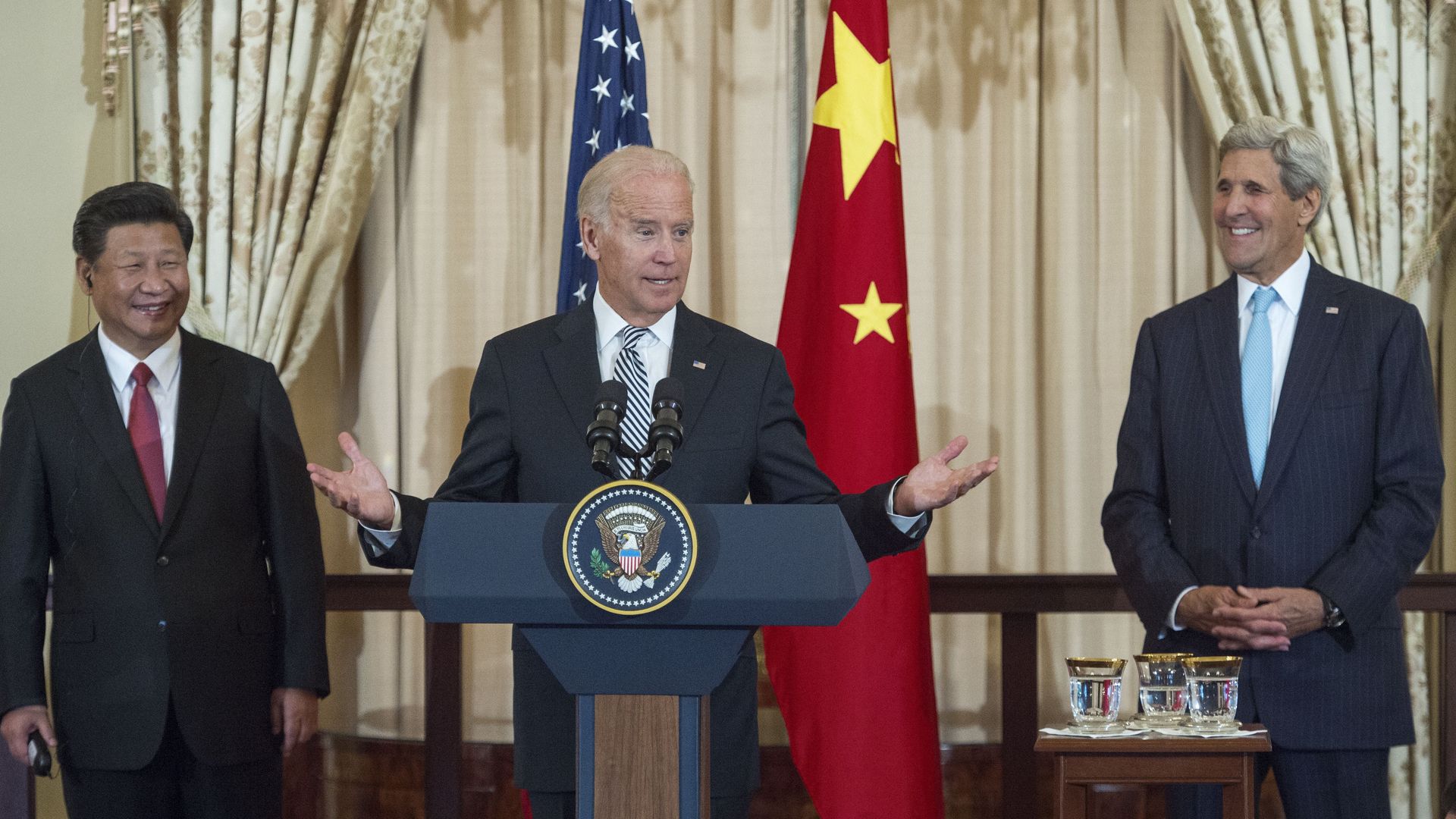 | | | Xi, Biden and John Kerry in 2015. Photo: Paul J. Richards/AFP via Getty | | | | Both sides described the Jake Sullivan/Yang Jiechi meeting in Zurich as "constructive" and "candid" — an improvement from other recent encounters in which, U.S. officials say, Chinese officials were either chiding their U.S. interlocutors or sticking stubbornly to prepared talking points. Yes, but: The two spent much of their six-hour meeting talking not about the key issues in the relationship, but about how the U.S. and China can engage going forward without snubs, insults and the risk of dangerous misunderstandings. Nine months into Biden's term, the relationship hasn't really left the starting line. - Asked after the meeting whether there is any single issue on which the U.S. and China are currently able to work productively, a senior U.S. official did not name one.
The big picture: The relationship was always going to be tense, but it's arguably in the superpowers' mutual interest to work together on things like vaccine access and the pandemic recovery, climate policy ahead of the critical COP26 summit, geopolitical issues like North Korea, and the trade disputes left over from Donald Trump's tenure. - Instead, vaccine diplomacy has become another arena of competition, and the climate summit looks doomed to dysfunction.
- The Biden administration this week accused Beijing of cheating on Trump's "Phase One" trade deal and said there will be no "Phase Two."
- Plus, when major issues have come before forums like the UN Security Council, the U.S. and China have consistently been on opposite sides.
Between the lines: Biden came into office promising to compete with China in areas like technological development, confront Beijing for its human rights abuses, and cooperate on climate change and other critical issues. - But China has said it won't deal with issues like climate separately from the broader relationship: If the U.S. wants confrontation, the rhetoric goes, it will get it.
The bottom line: The senior official expressed Biden's current objectives for the relationship in relatively modest terms: - "What we are trying to achieve is a steady state between the United States and China where we are able to compete intensely but to manage that competition responsibly."
|     | | | | | | A message from Malwarebytes Business Solutions | | Secure your business devices and data from cyberattacks today | | |  | | | | Malwarebytes Business Solutions' Back to Business Sale has been extended. There's never been a better time to level up your security stack with the top-rated, cloud-based solution. Get 25% off and try Endpoint Protection or Endpoint Detection and Response with 72-hour ransomware rollback. | | | | | | Bonus: Where in the world? |  | | | Screengrab via Apple Maps | | | | Today we're visiting two major coastal cities. I know that's not much to work with, but can you name them? Hint: If the sprawl of the southern city seems to stop suddenly as it approaches the northern one, that's no accident. Scroll to the bottom for the answer. |     | | | | | | 4. China, secrets and spies grab bag | 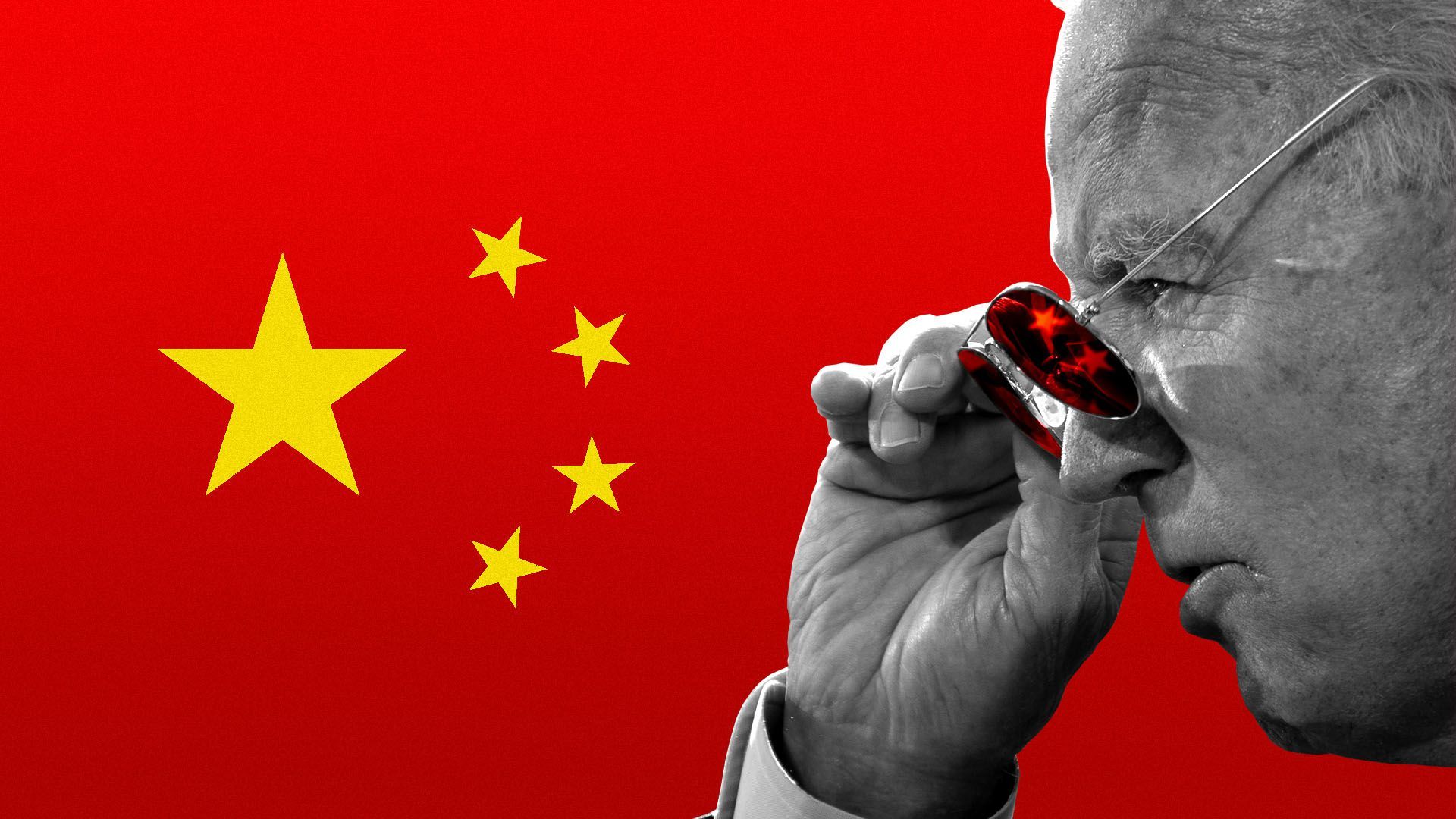 | | | Sarah Grillo/Axios. Photo: Drew Angerer/Getty Images | | | | Three stories that bear some watching: - CIA director Bill Burns announced Thursday that the agency is forming a China Mission Center to address "the most important geopolitical threat we face in the 21st century, an increasingly adversarial Chinese government." (Axios)
- "Top American counterintelligence officials warned every C.I.A. station and base around the world last week about troubling numbers of informants recruited from other countries to spy for the United States being captured or killed." (NYT)
- "A U.S. special-operations unit and a contingent of Marines have been secretly operating in Taiwan to train military forces there, U.S. officials said, part of efforts to shore up the island's defenses as concern regarding potential Chinese aggression mounts." (WSJ)
|     | | | | | | 5. European politics: "Traffic light" turns green in Germany | 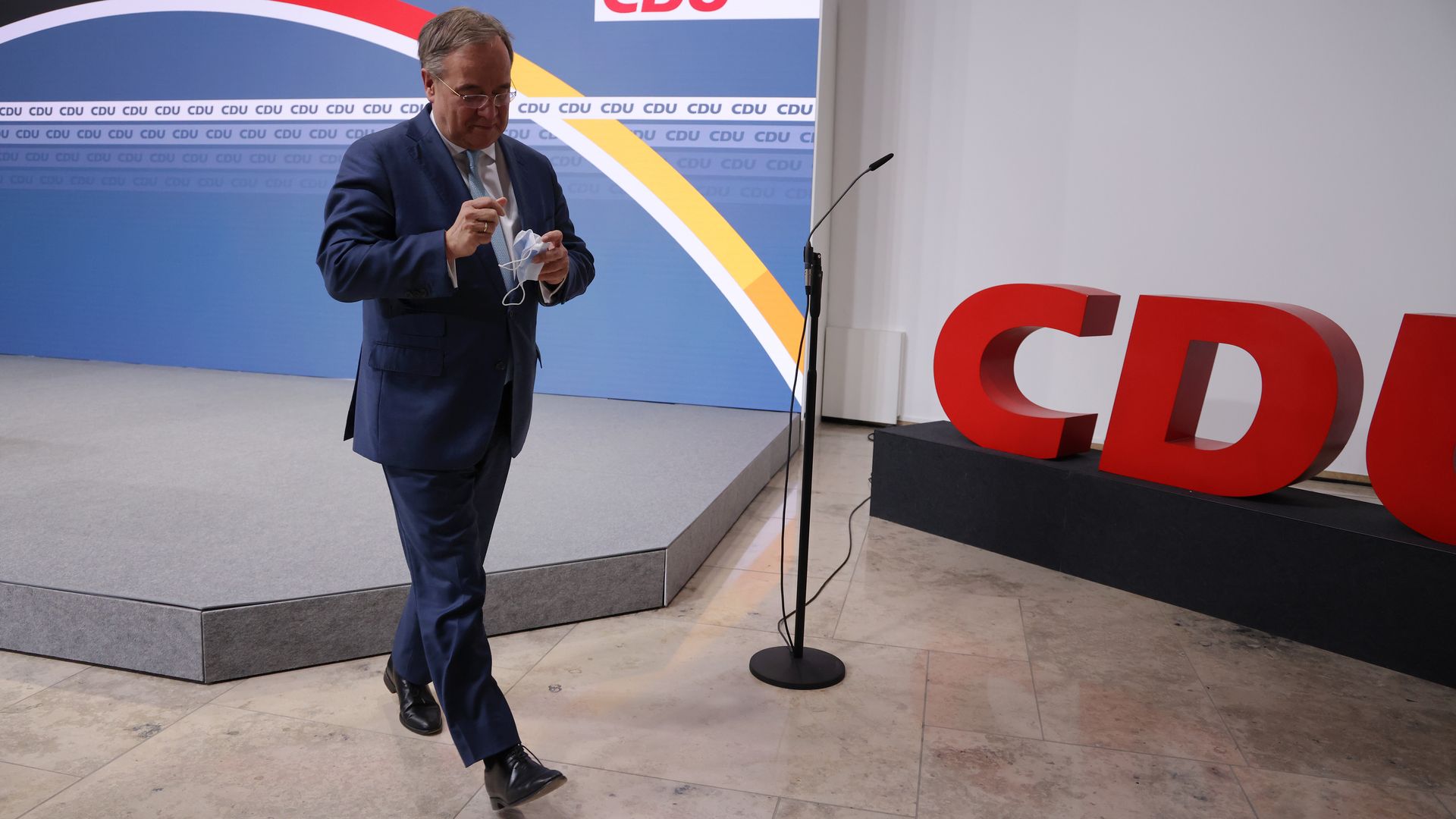 | | | Laschet takes a step down. Photo: Sean Gallup/Getty Images | | | | The chair of Germany's ruling Christian Democrats (CDU) prepared to step aside today as three rival parties began coalition negotiations that will likely end with the CDU out of power for the first time since Angela Merkel was elected in 2005, Axios fellow Fabienne Kinzelmann writes. The big picture: The Greens and the liberals (FDP) — now kingmakers because either major party would need them to govern — began exploratory talks with the election-winning Social Democrats (SPD) aimed at forming a "traffic light coalition," so named because of the parties' colors. What they're saying: - Armin Laschet, who led the CDU to a historic defeat, said the party should convene soon to decide on its leadership, signaling he was prepared to resign.
- Markus Söder, leader of the CDU's Bavarian sister party and a Laschet rival, said, "The FDP and the Greens have decided to go down the path of the traffic light. They must now follow it consistently."
- But Robert Habeck, the Greens' co-leader, said a "Jamaica coalition" (CDU/Greens/FDP) was still possible: "The cookie is far from eaten."
- His co-leader Annalena Baerbock called for a coalition in which the Greens and FDP will be "on eye level" with the SPD.
What to watch: This will take a while. The SPD says it hopes to have a coalition by December. More European politics headlines: - Poland's Constitutional Tribunal ruled today that Poland's constitution supersedes some EU laws in a direct challenge to the bloc's legal authority.
- Austria's government appears close to collapse with Chancellor Sebastian Kurz under investigation in connection with an alleged scheme to pay for the publication of favorable opinion polling.
|     | | | | | | 6. Crown Prince gets New Castle | 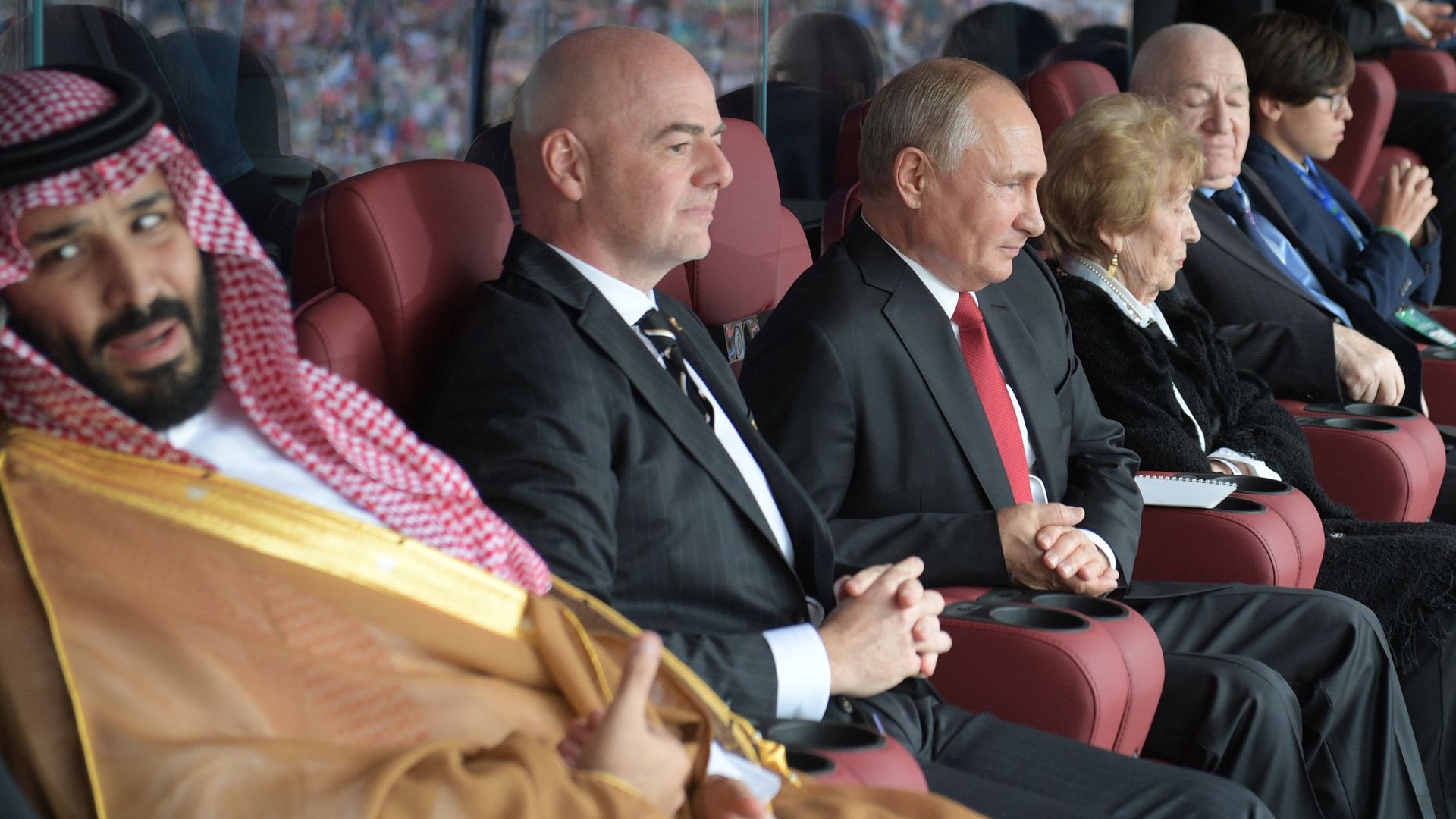 | | | Just some ordinary soccer fans. Photo: Lexey Druzhinin/AFP via Getty | | | | Congratulations to Saudi Crown Prince Mohammed bin Salman, the new de facto owner of Newcastle United Football Club. Driving the news: Saudi Arabia's sovereign wealth fund completed the deal today after an 18-month delay. - One roadblock was the fact that, during the recent dispute with Qatar, Saudi Arabia had been blocking the Qatari-owned broadcaster with rights to the English Premier League and pirating the games instead on state TV.
- With that resolved, the league also determined that the takeover would not put the Saudi state in control of the club — somewhat inexplicable, given MBS is the fund's chairman.
- The Saudis bought the club from Mike Ashley, who was himself a controversial figure (for the club's persistent mediocrity during his tenure and the business practices of his sportswear company, not for the murder of any dissidents).
MBS is following other Gulf royals into the owner's box. - The 2008 purchase of Manchester City by a member of the Abu Dhabi royal family and 2011 takeover of Paris Saint-Germain by the Emir of Qatar propelled the two to the pinnacle of the sport and helped create a tier of ultra-rich teams that compete amongst themselves for the world's most expensive players (PSG recently signed Lionel Messi).
- That's the club that Newcastle — a historic and long-suffering team from the north of England with a rabid fan base — is now joining.
- If all goes to plan, they'll soon no longer be near the bottom of the standings competing with minnows like Norwich (owned by a TV chef), but up with their fellow petrodollar-powered powerhouses like league-leading Chelsea, owned by Russian oligarch Roman Abramovich.
Whether that's good for the league or not, time will tell. |     | | | | | | 7. Stories we're watching | 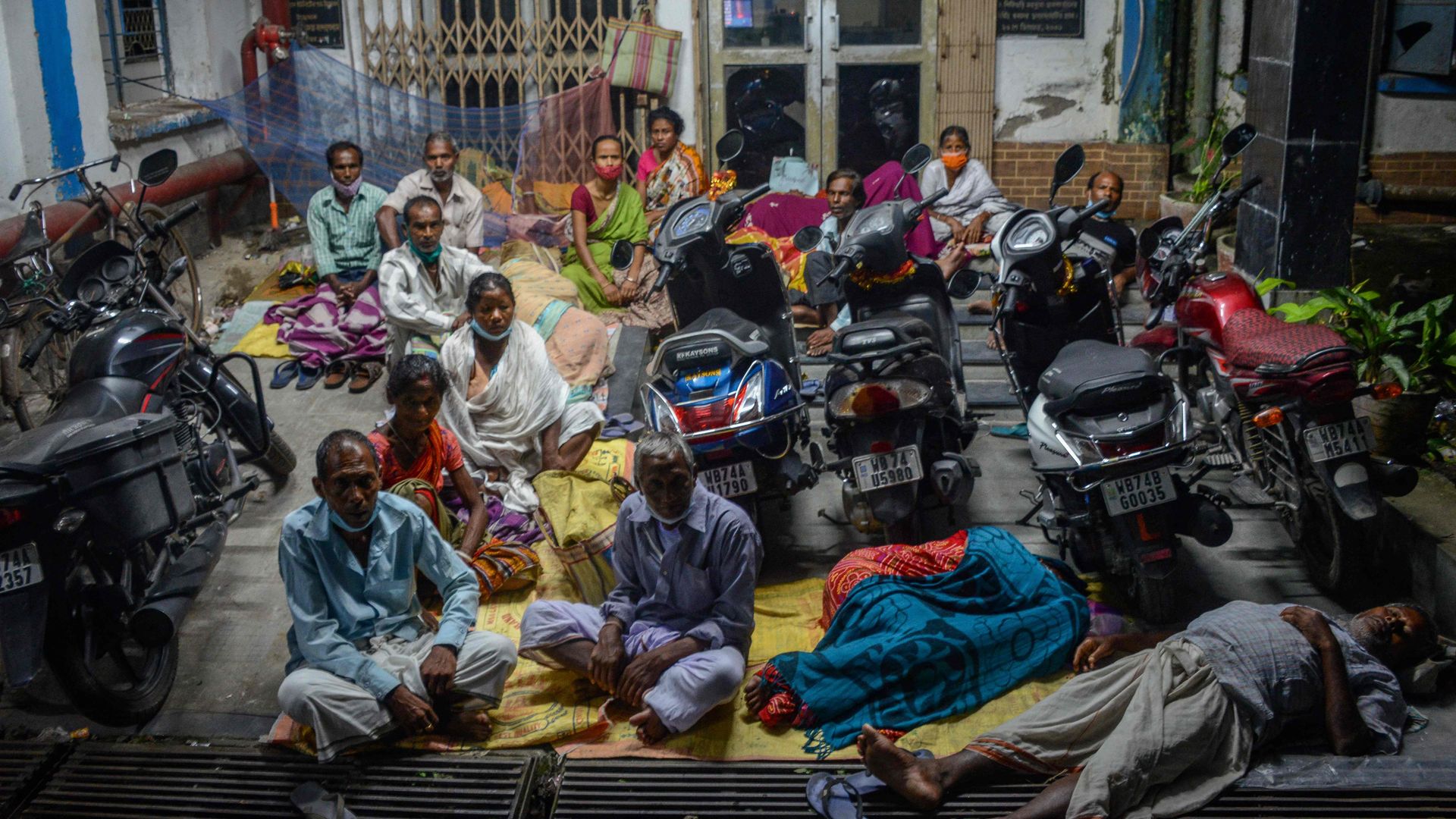 | | | Camping out to get a vaccine, in Siliguri, India. Photo: Diptendu Dutta/AFP via Getty | | | - New malaria vaccine is a game-changer
- Pandemic latest: WHO sending North Korea supplies; India to pay victims' families; Australia bans tourism until 2022
- Pandora papers: 38 Ukrainian politicians named; PR war in D.C.; Jordanian media ignores king claims
- Venezuela reopening border with Colombia
- Son of ex Philippine dictator running for president
- U.S. to probe claims Afghan president fled with millions
- Russia makes movie in space
Quoted: "Foreign policy frameworks beginning with the word 'strategic' often raise more questions than they answer. ... 'Strategic competition' reflects uncertainty about what that competition is over and what it means to win." — Jake Sullivan and Kurt Campbell, writing in Foreign Affairs in 2019. They are now Biden's national security adviser and top Asia adviser. "Goodbye, 'great power competition.' Hello, 'strategic competition.' A Defense Department spokesperson confirmed ... that the Pentagon will use the new phrase to describe its approach toward China." |     | | | | | | A message from Malwarebytes Business Solutions | | Secure your business devices and data from cyberattacks today | | |  | | | | Malwarebytes Business Solutions' Back to Business Sale has been extended. There's never been a better time to level up your security stack with the top-rated, cloud-based solution. Get 25% off and try Endpoint Protection or Endpoint Detection and Response with 72-hour ransomware rollback. | | | | Answer: Tijuana and San Diego. |  | | It'll help you deliver employee communications more effectively. | | | | | | Axios thanks our partners for supporting our newsletters. If you're interested in advertising, learn more here.
Sponsorship has no influence on editorial content. Axios, 3100 Clarendon Blvd, Suite 1300, Arlington VA 22201 | | | You received this email because you signed up for newsletters from Axios.
Change your preferences or unsubscribe here. | | | Was this email forwarded to you?
Sign up now to get Axios in your inbox. | | | | Follow Axios on social media:    | | | | | |












No comments:
Post a Comment